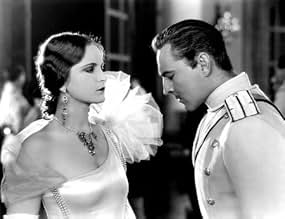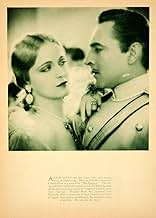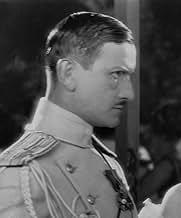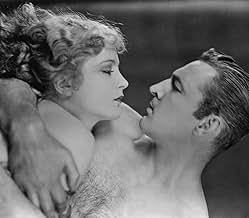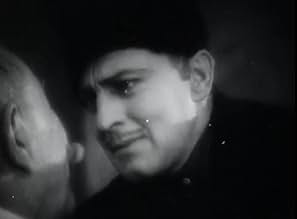Agrega una trama en tu idiomaIn Czarist Russia, a peasant officer, resented by the aristocrats, falls in love with a princess.In Czarist Russia, a peasant officer, resented by the aristocrats, falls in love with a princess.In Czarist Russia, a peasant officer, resented by the aristocrats, falls in love with a princess.
- Dirección
- Guionistas
- Elenco
- Ganó 1 premio Óscar
- 4 premios ganados en total
John Bleifer
- Soldier
- (sin créditos)
Albert Conti
- Commission Board Member
- (sin créditos)
Gregory Gaye
- Officer
- (sin créditos)
Lena Malena
- Tamara's Friend
- (sin créditos)
Michael Mark
- Soldier
- (sin créditos)
Dick Sutherland
- Revolutionary Board Member
- (sin créditos)
Wilhelm von Brincken
- Commission Board Member
- (sin créditos)
Opiniones destacadas
TEMPEST (United Artists, 1928), presented by Joseph M. Schenck, directed by Sam Taylor, with uncredited work by Lewis Milestone, bears no relation to the William Shakespeare play, but is actually a military love story set against the background of the Russian Revolution in 1914. It stars the legendary "great profile" John Barrymore as Ivan Markov, a peasant soldier who becomes an officer in the Russian Army, after being told by his comrades that no peasant has been commissioned to a higher rank in years. After he and his officers take a swim in the lake with only their uniform trousers on, Sergeant Bubba (Louis Wolheim), Ivan's closest friend, who has encountered three young girls also bathing on the other side, as a practical joke, steals their clothing. After being told for what he has done, Ivan interferes in Bubba's meddling and takes the garments to return them to the ladies. As he is doing his good deed, Ivan is confronted by the Princess Tamara (Camilla Horn), who immediately accuses him of stealing the clothes. Quite upset, she suddenly takes Ivan's whip and beats his naked chest with it. In return, Ivan takes her into his arms and kisses her. Later that evening Ivan encounters Tamara once again at a social function, and learns that she is the daughter of his superior (George Fawcett), who loves Ivan like a son. Ivan and Tamara dance together, with Tamara doing nothing else but insulting him. Afterwards, Ivan then drowns out his sorrows by stocking up on wine in a huge drinking glass and gulping it all down at once. Now drunk, Ivan loses himself and accidentally stumbles upon Tamara's bedroom where he proceeds to fall asleep on her couch. After being discovered there, Tamara calls for her father and her suitor (Ullrich Haupt), which then puts an end to Ivan's military career as he is stripped of his uniform and sentenced to serve five years in prison. After the outbreak of the war, the calvary and the other prisoners are ordered to the front, which leaves Ivan behind in solitary confinement, as ordered by Tamara's suitor. Released by an insane communist peddler (Boris De Fas), Ivan joins forced with him to become an important official while Tamara and her father are no longer aristocrats in high social standing. Now that Ivan is in control, will he treat her as unjustly as he was misjudged by her?
TEMPEST, which plays like a proposed project for Rudolph Valentino, who has since died in 1926, offers John Barrymore in one of his finer performances of the silent screen. Camilla Horn, a blonde beauty recently imported from Germany, makes her Hollywood movie debut in this production. Before returning to her native Germany, she was re-teamed one more time with John Barrymore in the silent drama, ETERNAL LOVE (United Artists, 1929).
Presented in the supporting cast are Michael Visaroff, Lena Malena and Michael Marke. Louis Wolheim provides his usual comedic moments as Ivan's loyal friend, while Ullrich Haupt adds to his villainy as Tamara's jealous suitor. George Fawcett, the familiar face from numerous DW Griffith silents of long ago, gives his usual reliable performance as the Russian general who would later find himself facing a firing squad. And then there is not so well known Boris De Fas, menacing, sinister and gap-toothed who somewhat resembles John Barrymore's evil side of his other personality from his own version to the 1920 horror film, DR. JEKYLL AND MR. HYDE. This is his only known Hollywood screen role.
TEMPEST, with the running time of 104 minutes, was originally released theatrically with a synchronized musical score by Hugo Riesenfeld. It became one of the twelve selected films to appear during the summer months on New York City's public television Channel 13's 1975 presentation of "The Silent Years" as hosted by Lillian Gish, accompanied by another excellent piano score by William Perry from the Paul Killian collection. Before its presentation, Gish talks about the beautiful photography by Charles Rosher as well as the lavish sets by William Cameron Menzies. Besides these fine assets, TEMPEST includes several fine dramatic moments by Barrymore: One in which Barrymore's Ivan becomes very teary-eyed as he is disgraced in front of his regiment, stripped of his uniform with his sword broken in half by a superior, and another in which Ivan, nearly going insane while being left in solitary confinement, surrounded by those high prison walls, only to look up on one of those walls and imagining the face of Tamara looking down at him, but as for John Barrymore's earlier drunken scene, for him that must have been a natural.
Like many silent films distributed around 1928-29, TEMPEST has become underrated and forgotten due to lack of television or any other kind of revival over the years. It was distributed on video cassette in the 1980s through Blackhawk Video and Republic Home Video (Blackhawk's merger), accompanied by the William Perry piano score used for "The Silent Years" (1975). Distribution on DVD from Image Entertainment contains choices of underscoring: 1)Original 1928 orchestral score and 2) Piano accompaniment by Philip Carli. (***)
TEMPEST, which plays like a proposed project for Rudolph Valentino, who has since died in 1926, offers John Barrymore in one of his finer performances of the silent screen. Camilla Horn, a blonde beauty recently imported from Germany, makes her Hollywood movie debut in this production. Before returning to her native Germany, she was re-teamed one more time with John Barrymore in the silent drama, ETERNAL LOVE (United Artists, 1929).
Presented in the supporting cast are Michael Visaroff, Lena Malena and Michael Marke. Louis Wolheim provides his usual comedic moments as Ivan's loyal friend, while Ullrich Haupt adds to his villainy as Tamara's jealous suitor. George Fawcett, the familiar face from numerous DW Griffith silents of long ago, gives his usual reliable performance as the Russian general who would later find himself facing a firing squad. And then there is not so well known Boris De Fas, menacing, sinister and gap-toothed who somewhat resembles John Barrymore's evil side of his other personality from his own version to the 1920 horror film, DR. JEKYLL AND MR. HYDE. This is his only known Hollywood screen role.
TEMPEST, with the running time of 104 minutes, was originally released theatrically with a synchronized musical score by Hugo Riesenfeld. It became one of the twelve selected films to appear during the summer months on New York City's public television Channel 13's 1975 presentation of "The Silent Years" as hosted by Lillian Gish, accompanied by another excellent piano score by William Perry from the Paul Killian collection. Before its presentation, Gish talks about the beautiful photography by Charles Rosher as well as the lavish sets by William Cameron Menzies. Besides these fine assets, TEMPEST includes several fine dramatic moments by Barrymore: One in which Barrymore's Ivan becomes very teary-eyed as he is disgraced in front of his regiment, stripped of his uniform with his sword broken in half by a superior, and another in which Ivan, nearly going insane while being left in solitary confinement, surrounded by those high prison walls, only to look up on one of those walls and imagining the face of Tamara looking down at him, but as for John Barrymore's earlier drunken scene, for him that must have been a natural.
Like many silent films distributed around 1928-29, TEMPEST has become underrated and forgotten due to lack of television or any other kind of revival over the years. It was distributed on video cassette in the 1980s through Blackhawk Video and Republic Home Video (Blackhawk's merger), accompanied by the William Perry piano score used for "The Silent Years" (1975). Distribution on DVD from Image Entertainment contains choices of underscoring: 1)Original 1928 orchestral score and 2) Piano accompaniment by Philip Carli. (***)
Enjoyable historical drama in which The Great Profile plays a Russian peasant who rises to the rank of Lieutenant immediately before the revolution only to find himself shunned by his fellow officers and the haughty princess he falls for. Fine chemistry between Barrymore and the beautiful German actress Camilla Horn helps paper over most of the film's meagre flaws.
Drama
Format: Standard 4:3, B&W, silent
Director: Sam Taylor
Starring: John Barrymore and Camilla Horn
Drew Barrymore's grandfather John is the main highlight of this film. His portrayal of Ivan Markov during 1914 Czarist Russia is ripe with excellent acting and great emotion, which flows forth from his face. Some supporting actors in this film were not too great, except for George Fawcett, who plays the commanding General of Ivan's garrison. The main problem with the characters and acting is too much fluff and too much over acting, but Barrymore is amazing.
In one scene, he is being demoted and sent to jail and the anguish coming off of his face, as they tear his medals off of his vest, is something to be seen. In another scene we see Ivan enter into madness and just the look on his face is something I won't forget for a while. While he is in prison, he begins to see images on the prison wall, which is done quite well with very good matte work for 1928.
Fawcett's character is very likeable and you enjoy seeing him every time he comes into a scene. His kindness he shows towards Ivan, from behind a rough exterior, is very believable and heart-warming. I also enjoyed Louis Wolheim as Bulba, but 3/4 of the way through the film his character changes and I didn't like that.
The story is quite good, and I worry that some of it may have been lost due to missing splices that looked like chunks of lost continuity. Right in the very beginning and especially at the very end. An excellent shot of the town opens up to a really nice story that falls apart slightly by the end, but definitely a film worth seeing. It is not great, but is very good.
8.2 (B MyGrade) = 8 IMDB.
Drew Barrymore's grandfather John is the main highlight of this film. His portrayal of Ivan Markov during 1914 Czarist Russia is ripe with excellent acting and great emotion, which flows forth from his face. Some supporting actors in this film were not too great, except for George Fawcett, who plays the commanding General of Ivan's garrison. The main problem with the characters and acting is too much fluff and too much over acting, but Barrymore is amazing.
In one scene, he is being demoted and sent to jail and the anguish coming off of his face, as they tear his medals off of his vest, is something to be seen. In another scene we see Ivan enter into madness and just the look on his face is something I won't forget for a while. While he is in prison, he begins to see images on the prison wall, which is done quite well with very good matte work for 1928.
Fawcett's character is very likeable and you enjoy seeing him every time he comes into a scene. His kindness he shows towards Ivan, from behind a rough exterior, is very believable and heart-warming. I also enjoyed Louis Wolheim as Bulba, but 3/4 of the way through the film his character changes and I didn't like that.
The story is quite good, and I worry that some of it may have been lost due to missing splices that looked like chunks of lost continuity. Right in the very beginning and especially at the very end. An excellent shot of the town opens up to a really nice story that falls apart slightly by the end, but definitely a film worth seeing. It is not great, but is very good.
8.2 (B MyGrade) = 8 IMDB.
Unfortunately, this is not John Barrymore starring in William Shakespeare's "The Tempest" - rather, "This is the storm-swept romance of a poor dragoon and a proud princess - of imperial Russia - in the last calm before the red tempest of terror. The year is 1914. The hour is midnight. The place is Volinsk - a garrison town near the Austrian border," as introduced in helpful title cards.
"'Tempest' was completed at the end of the silent era, and its release was delayed until it could be equipped with recorded musical accompaniment on Vitaphone discs. Seven of the discs have survived and are synchronized here; the gaps are filled by re-editing the available sound. A new digital stereo score performed by pianist Philip Carli is the primary soundtrack," according to the "Image Entertainment" DVD sleeve, "Our digital transfer is from a print made in the early 1950s from the camera negative."
Mr. Barrymore looks remarkable hale and hearty for an actor born in the early 1880s, showing off a still enviable physique in his shirtless scenes. He is often heavily made-up, and too obviously maneuvered into as many "Great Profile" photo opportunities as possible, but his performance as the upwardly mobile Russian peasant does not disappoint. Barrymore certainly delivers.
"Sam Taylor, who helmed some of Harold Lloyd's and Mary Pickford's most successful films, is the only credited director on 'Tempest'. However, in mid-production, Taylor replaced Russian-born Lewis Milestone, who in turn had taken over from Russian émigré director Victor Tourjansky," explains Image, "The original script by Erich von Stroheim was rewritten by Milestone and much modified by C. Gardner Sullivan, a reliable craftsman who received sole screen credit. Some original aspirations for authenticity survive in the contributions of several actual White Russian officers working as small-part players and technical advisers."
The film greatest strength is the outstanding work by the United Artists assembled technical crew. Titles by George Marion Jr., art direction by William Cameron Menzies, and photography by Charles Rosher were all praised at Hollywood's first annual "Academy Awards" banquet. Marion was mentioned for his work on Colleen Moore's "Oh Kay!" Mr. Menzies won for "Tempest and "The Dove". And, Mr. Rosher was mentioned for the winning "Sunrise", Ms. Pickford's "My Best Girl" and "Tempest".
Pretty princess Camilla Horn, who impressed in F.W. Murnau's "Faust" (1926), looks like she was producer (and then lover) Joseph M. Schenck's choice to take the Greta Garbo route to super-stardom. It doesn't work, herein, but neither is Ms. Horn a deterrent. Louis Wolheim and George Fawcett are marvelous as always. The Russian-born Boris de Fast makes an excellent impression as the gap-toothed socialist peddler. If the "Oscar" category for "Supporting Actor" had existed, Mr. Wolheim might have been noted, for some combination of acting effort; he appeared in no less than four films nominated during the eligibility year.
******* Tempest (5/17/28) Sam Taylor ~ John Barrymore, Camilla Horn, Louis Wolheim, Boris de Fast
"'Tempest' was completed at the end of the silent era, and its release was delayed until it could be equipped with recorded musical accompaniment on Vitaphone discs. Seven of the discs have survived and are synchronized here; the gaps are filled by re-editing the available sound. A new digital stereo score performed by pianist Philip Carli is the primary soundtrack," according to the "Image Entertainment" DVD sleeve, "Our digital transfer is from a print made in the early 1950s from the camera negative."
Mr. Barrymore looks remarkable hale and hearty for an actor born in the early 1880s, showing off a still enviable physique in his shirtless scenes. He is often heavily made-up, and too obviously maneuvered into as many "Great Profile" photo opportunities as possible, but his performance as the upwardly mobile Russian peasant does not disappoint. Barrymore certainly delivers.
"Sam Taylor, who helmed some of Harold Lloyd's and Mary Pickford's most successful films, is the only credited director on 'Tempest'. However, in mid-production, Taylor replaced Russian-born Lewis Milestone, who in turn had taken over from Russian émigré director Victor Tourjansky," explains Image, "The original script by Erich von Stroheim was rewritten by Milestone and much modified by C. Gardner Sullivan, a reliable craftsman who received sole screen credit. Some original aspirations for authenticity survive in the contributions of several actual White Russian officers working as small-part players and technical advisers."
The film greatest strength is the outstanding work by the United Artists assembled technical crew. Titles by George Marion Jr., art direction by William Cameron Menzies, and photography by Charles Rosher were all praised at Hollywood's first annual "Academy Awards" banquet. Marion was mentioned for his work on Colleen Moore's "Oh Kay!" Mr. Menzies won for "Tempest and "The Dove". And, Mr. Rosher was mentioned for the winning "Sunrise", Ms. Pickford's "My Best Girl" and "Tempest".
Pretty princess Camilla Horn, who impressed in F.W. Murnau's "Faust" (1926), looks like she was producer (and then lover) Joseph M. Schenck's choice to take the Greta Garbo route to super-stardom. It doesn't work, herein, but neither is Ms. Horn a deterrent. Louis Wolheim and George Fawcett are marvelous as always. The Russian-born Boris de Fast makes an excellent impression as the gap-toothed socialist peddler. If the "Oscar" category for "Supporting Actor" had existed, Mr. Wolheim might have been noted, for some combination of acting effort; he appeared in no less than four films nominated during the eligibility year.
******* Tempest (5/17/28) Sam Taylor ~ John Barrymore, Camilla Horn, Louis Wolheim, Boris de Fast
A really magnificent movie with great performances. Don’t get caught in the political aspects of the movie, because I think that you will loose the beauty of the story. So aside from that the movie takes place in Russia the days of the Czars. A sergeant from the lower class tries to win a promotion to lieutenant which he rightfully deserves. But it’s hard, not to say impossible for someone from the lower class to get promoted and to be accepted by the aristocrats. The situation gets more complicated when the handsome Sergeant Ivan Markov falls in love with the Princess. But this are the last days of the Czarist Russia and the times are dangerous. An unbelievably captivating movie, the first time I saw it I couldn't get it out of my mind. I had to see it a second time too and a third… this movie leaves a mark! Even though there are only few months ago that I saw it, it is already one of my favorites. It has great performances from great actors like John Barrymore, Camilla Horn, Louis Wolheim and all the others and great directing work. I think you will fall in love with this movie if you see it. I have seen films with John Barrymore but this movie made me to truly appreciate him for a strange reason. It had great energy and emotion from the story and the performances of the actors.
¿Sabías que…?
- TriviaCarole Lombard was considered for the role of Princess Tamara.
Selecciones populares
Inicia sesión para calificar y agrega a la lista de videos para obtener recomendaciones personalizadas
Detalles
Contribuir a esta página
Sugiere una edición o agrega el contenido que falta



